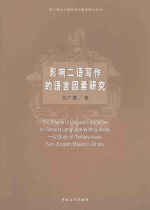图书介绍
影响二语写作的语言因素研究PDF|Epub|txt|kindle电子书版本网盘下载

- 马广惠著 著
- 出版社: 南京:河海大学出版社
- ISBN:7563020802
- 出版时间:2004
- 标注页数:204页
- 文件大小:24MB
- 文件页数:232页
- 主题词:英语-写作-教学研究-英文
PDF下载
下载说明
影响二语写作的语言因素研究PDF格式电子书版下载
下载的文件为RAR压缩包。需要使用解压软件进行解压得到PDF格式图书。建议使用BT下载工具Free Download Manager进行下载,简称FDM(免费,没有广告,支持多平台)。本站资源全部打包为BT种子。所以需要使用专业的BT下载软件进行下载。如BitComet qBittorrent uTorrent等BT下载工具。迅雷目前由于本站不是热门资源。不推荐使用!后期资源热门了。安装了迅雷也可以迅雷进行下载!
(文件页数 要大于 标注页数,上中下等多册电子书除外)
注意:本站所有压缩包均有解压码: 点击下载压缩包解压工具
图书目录
Part One Background1
Chapter One Introduction4
1.Need for the study6
Resolving some of the problems and inconsistent findings in L2 writing research7
Verifying some of the hypotheses related to L2 writing10
Improving the efficiency of the teaching and learning of L2 writing in China11
Summary12
2.Outline of the book13
Chapter Two An overview:L1 writing ability,L2 proficiency and L2 writing ability——a trilateral relationship14
1.Introduction14
2.The relationship between L1 writing ability and L2 writing ability14
Assumptions,findings,hypotheses and studies14
Problems,causes and solutions18
3.L1 writing ability and L2 proficiency19
4.The relationship between L2 proficiency and L2 writing ability22
Research findings and some related studies22
"L2 proficiency"and L2 writing ability22
Reading-writing relationship28
Problems and their causes31
Solutions32
5.Methodologies in L2 writing research——quantitative vs.qualitative33
6.Summary35
Part Two Theoretical Framework and Research Design37
Chapter Three The Conceptual Framework for the Study40
1.Introduction40
2.A general description of Grabe and Kaplan's(1996)model41
3.The focus of the study45
Introduction45
Competence and performance46
Comprehension and production49
Defining L2 proficiency50
Summary50
4.Systematic effects of L2 learners'linguistic variables on L2 writing51
The specific conceptual model to be tested in this study51
The effects of L1 writing ability on L2 writing ability52
Measures of writing ability——quality,fluency,and superstructure53
Comprehension and production55
5.Summary58
Chapter Four Research Design for the Quantitative Part of the Study59
1.Introduction59
2.Hypotheses59
3.Subjects60
4.Instruments62
Questionnaire63
Tests of L2 comprehension competencies(Appendix 2)63
Tests of L2 comprehension skills(Appendix 3)66
Tests of L2 production competencies(Appendix 4)66
Oral test of English speaking ability67
English writing task68
Chinese writing task68
5.Data collection69
6.Treatment of the data70
Scoring of the test papers70
Oral score70
Total score of all the subtests of L2 proficiency71
Typing all the compositions71
Composition rating procedure71
Word counting72
Scoring of superstructure72
7.Procedures for data analyses73
Introduction73
Statistical analyses with SPSS74
Reliabilities of the tests75
Structural equation modeling with STREAMS and LISREL75
Procedures for model building79
8.Summary81
Chapter Five Design for the Qualitative Part of the Study82
1.Introduction82
2.Research questions82
3.Definition of"skilled"and"unskilled"L2 student writers83
4.Subjects83
5.Procedures:data collection and analyses85
6.Summary88
Part Three Results and Analysis89
Chapter Six Results of Quantitative Part of the Study92
1.Introduction92
2.A general description of the causal model93
3.The effects of L1 writing ability on L2 writing ability96
The direct effect of L1 writing ability on L2 writing ability96
The indirect effects of L1 writing ability on L2 writing ability99
Different models of the relationships of L1 writing ability and L2 proficiency to L2 writing ability102
4.L2 production vocabulary106
5.L2 speaking ability108
6.The indirect effects of L2 comprehension variables on L2 writing ability110
L2 reading ability110
L2 listening ability114
L2 comprehension vocabulary115
L2 comprehension discourse competence118
7.L2 variables out of the model118
8.Summary120
Chapter Seven Qualitative Differences Between Skilled and Unskilled L2 Student Writers122
1.Introduction122
2.L1 writing ability122
Differences in L1 writing ability122
Transfer of writing ability from L1 to L2133
3.L2 production vocabulary competence140
Differences between the skilled and unskilled L2 student writers140
A tentative explanation for the differences in L2 vocabulary150
4.L2 speaking ability153
5.Qualitative differences in process155
6.Summary159
Part Four Conclusion161
Chapter Eight Findings,Implications,Suggestions and Conclusion164
1.Findings of the study164
2.Theoretical significance of the findings166
The use of a multi-dimensional model of L2 writing166
The need for reexamining existing theories of L2 writing168
3.Practical significance of the findings169
4.Strengths,weaknesses,and limitations of the study170
5.Suggestions for future research172
6.Conclusion173
References175
Appendices182
Appendix 1 Questionnaire for Personal Information182
Appendix 2 Tests of EFL Comprehension Competencies183
(1)EFL Recognition Vocabulary Test183
(2)EFL Recognition Grammar Test184
(3)EFL Recognition Discourse Test185
Appendix 3 Tests of EFL Comprehension Skills187
(1)Listening Comprehension Test(20 minutes)(Sample)187
(2)Reading Comprehension Test(35 minutes)(Sample)188
Appendix 4 Tests of EFL Production Competencies191
(1)EFL Production Vocabulary Test191
(2)EFL Production Grammar Test192
(3)EFL Production Discourse Test193
Appendix 5 The Reading-aloud Passage(From Heaton 1975;p.85)194
Appendix 6 Questions for EFL Oral Test195
Appendix 7 Heaton's(1975)Scheme of Measuring the Ability to Communicate Orally(p.95)196
Appendix 8 Test of Written English(TWE)Scoring Guidelines(In Chai et al.1991)197
Appendix 9 Correlation Matrix199
Appendix 10 Chinese Compositions of Subjects 1,2,3,and 4200
Appendix 11 EFL Compositions of Subjects 1,2,3,and 4202